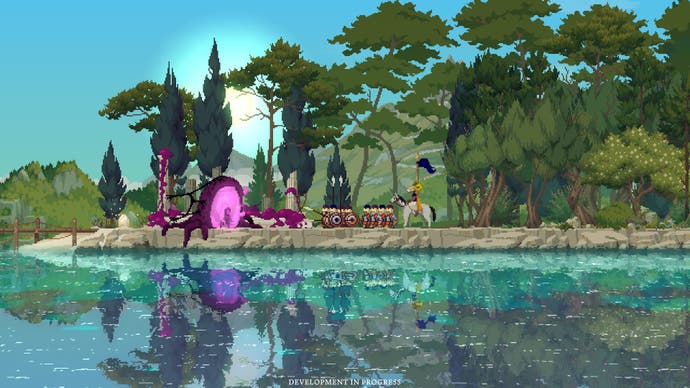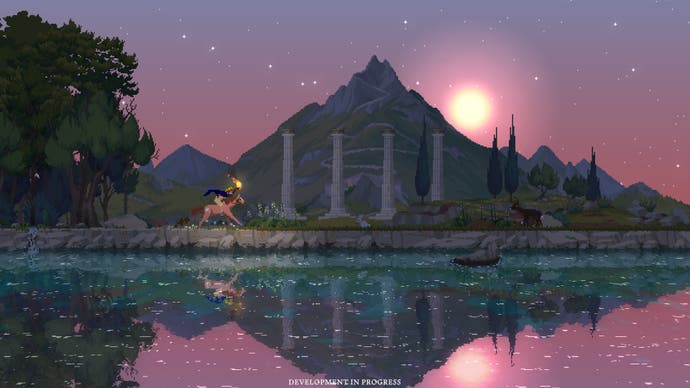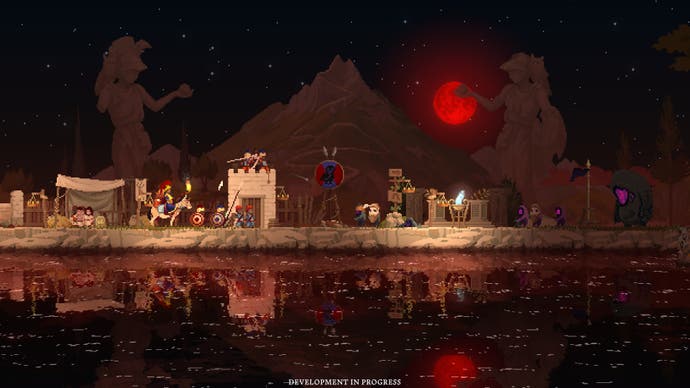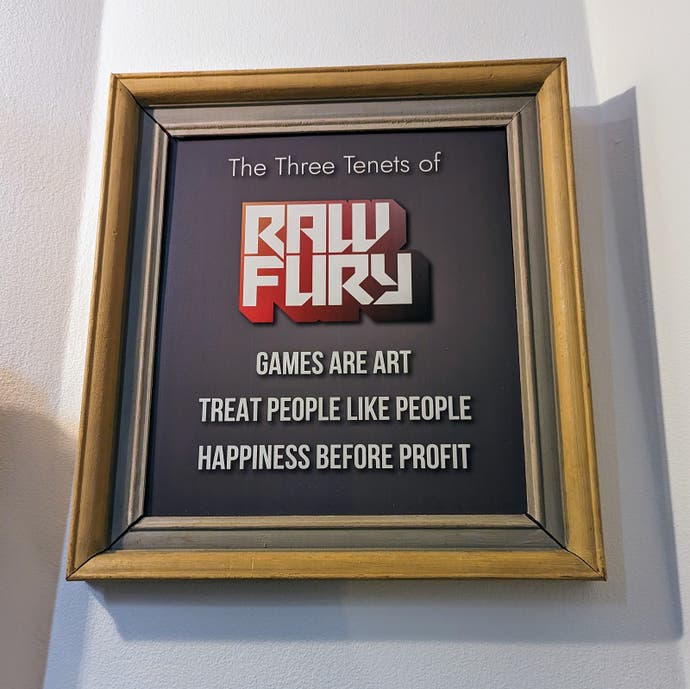The double-act of Raw Fury and Kingdom shines like a lighthouse across an industry floundering at sea
"Games are art. Treat people like people. Happiness before profit."
I still remember it well: I was at EGX 2015 in Birmingham, and one game turned my head like a doorknob. It wasn't one of the blockbusters, or one of the games with a showy booth, but a much smaller game on a couple of screens, nestled among many others. On that screen was what looked to me like a pixel art fairytale. A person with a crown sat on top of a horse in a woodland area, with water in the foreground of the image that reflected the scene above. It seemed to breathe as I watched it. I was entranced. When I played it, the feeling intensified. There were no instructions about what to do in the game, so I had to feel it out, galloping left and right on my horse, collecting coins, then dropping them to do various, unexplained things. Then came night and strange creatures infiltrating my base, who stole my money and the crown I was wearing. I had to start again. What happened? I had no idea. But I knew I wanted to play again.
Smitten, I caught up with the person who was showing that game in a hotel bar later that day. They were from a company I had never heard of before that day, and they told me this was their first game. The company's name, they said, was Raw Fury, and the game I had played was Kingdom: New Lands. Evidently, that encounter stuck with me, but I had no idea that nearly 10 years later I'd be at the studio's HQ in Stockholm playing Kingdom all over again.
Kingdom remains as important to Raw Fury now as it was then. It underpins everything the boutique indie publisher does. Kingdom was actually created in 2010, before Raw Fury came along. Legend has it that Thomas van den Berg, AKA Noio, who created the game with Marcus Banacle, AKA Licorice, did so initially as a pixel art study in horse riding. Slowly, though, the game took on a semblance of side-on tower defence, and the identifiable cornerstones of Kingdom - expanding a base by picking up and dropping coins, defeating portals at the leftmost and rightmost edges of the map that enemies come from, and surviving the night - were introduced.
Raw Fury launched Kingdom: New Lands in 2016, reintroducing the concept to the world. The company then followed it two years later with Kingdom: Two Crowns, adding split-screen co-op so two people could work on the same base at the same time. Since then, it's expanded on Two Crowns with a chunky Norse mythology expansion, a 1980s standalone expansion (in which you ride a BMX rather than a horse, brilliantly), and a samurai-themed addition. These all feel substantial enough to be new games. The same is true of the expansion I'm in Sweden playing now: the Greek mythology-themed Call of Olympus, which has only just been announced.
In it, you play as an ancient Greek leader who, as always in the series, slowly establishes a kingdom and protects it from the Greed creatures scurrying out of portals each night. But unlike in other Kingdom games, there's a quest system now, whereby you can take on missions from the well known Greek gods. From this comes a tangible sense of story in the game, which is something it hasn't really had before. You can establish different kingdoms for different gods as you work your way around an archipelago towards Mount Olympus, where a godly showdown awaits. With this focus on questing comes the ability to lead your troops out of your base and into battle, taking the fight to them rather than waiting for them to come to you. And should you be successful, the gods will be generous in their rewards, bestowing upon you powerful weaponry. You can use magical bows to rain down arrows on areas, or a magical hammer to smash into the ground to make it burn. Kingdom is more like an RPG in Call of Olympus than it's ever been before. And did I mention it has rideable pegasi and bears?
Underneath, it's still Kingdom of course. The core is sacrosanct and the team is wary about adding too much to it and detracting from it. You still ride left and right, collecting coins and then dropping them to build things and recruit troops, and your goal is still to expand the walls and reach of your kingdom. There's a bit of guidance available from an oracle now, so you don't lose your way in what you're supposed to be doing for the gods, but otherwise, it's still a game about discovery - still a game about dropping coins to see what happens, rather than being told where to go and what to do.




It's still as pretty as it ever was, too - prettier, even. There's more detail in the world because more people work on the game now, so animations are more intricate and there are more visual flourishes to delight you. Little wisps of pixelated smoke curl up into the air from torches, little pixelated birds flap by. Greek Mythology also makes for a striking setting for the game, with its white marble walls and jutting pillars, its buzzing summer evenings, and litany of colourful gods and powers. It's all here. In Call of Olympus, Kingdom is in fine form.
People talk quite openly at Raw Fury HQ about the importance of Kingdom to the company. It's the main franchise here, clearly, and it feels like the engine powering what the company does. Raw Fury actually acquired the IP from Thomas van den Berg in 2019, and now has an internal development of around a dozen people dedicated to making it, which I think is the company's only internal development team (based down in Croatia so I don't see it in Stockholm). Van den Berg still works with Raw Fury, though. The company published his Pizza Possum last year, so the relationship continues, which is nice to see.
Beyond being an enjoyable series in its own right, Kingdom provides the safety net Raw Fury has needed to do what it has done in the nine years it's been around, which is become an identifiable deliverer of smaller, interesting games. There have been a surprising amount of them, I realise, looking at the many framed images of them on the walls of the oversized town house the company resides in. Among them: Skald, Sable, Call of the Sea, Bad North, Norco, Cassette Beasts, Snufkin: Melody of Moominvalley, Townscaper, Atomicrops. We've reviewed all of those on Eurogamer and they've all scored highly. Raw Fury rarely seems to miss.

But what catches my eye most as I walk around the townhouse, which has a surprising amount of stairs as well as two large dogs padding around, adorably, is how many times I see the company's motto reinforced. It's there, repeated on walls and walkways for everyone to see. "The three tenets of Raw Fury," it reads. "Games are art. Treat people like people. Happiness before profit." On another wall: "Games are art." And again, and again.
A few years ago, I'd probably have cringed at that. You'll likely all remember the endless debates about "are games art?" as much as we do - they came up so much it became a cliché. But I don't cringe to see it on the walls of Raw Fury today. In 2024, that mantra shines like a lighthouse across an industry that's floundering at sea. It stands in dazzling contrast to the endless layoffs and studio closures we've been witness to. Only a month ago, we pondered what the point of Xbox was after the company closed Arkane Austin and Tango Gameworks - a thought that could be applied to Take-Two closing Roll7 and to many other layoff announcements. The overriding feeling emanating from it all was greed - coincidentally the main evil in the Kingdom series. Games as a way to make money. Profit before people.
It's against that backdrop that Raw Fury shines so bright. Hope is what I feel walking around it, because not only is this diametrically opposed approach refreshing - incredibly refreshing - it also seems to be working. It demonstrates that backing creativity is a viable thing to do. Granted, the company operates on a different scale to blockbuster development, but perhaps there lies a lesson too. Maybe spreading your bet on smaller things is a more sustainable - and more creative - way to go. Raw Fury's catalogue certainly reminds me how ecclectic and interesting games can be. It's telling what can be done when making money isn't the main concern.
If Kingdom is enabling that: wonderful. But whatever the reason, what the company is doing is a joy to see. Raw Fury and Kingdom walk hand in hand, and long may their journey continue to be.
This piece was written after a press trip to Raw Fury in Stockholm. Raw Fury paid for flights and accommodation.


